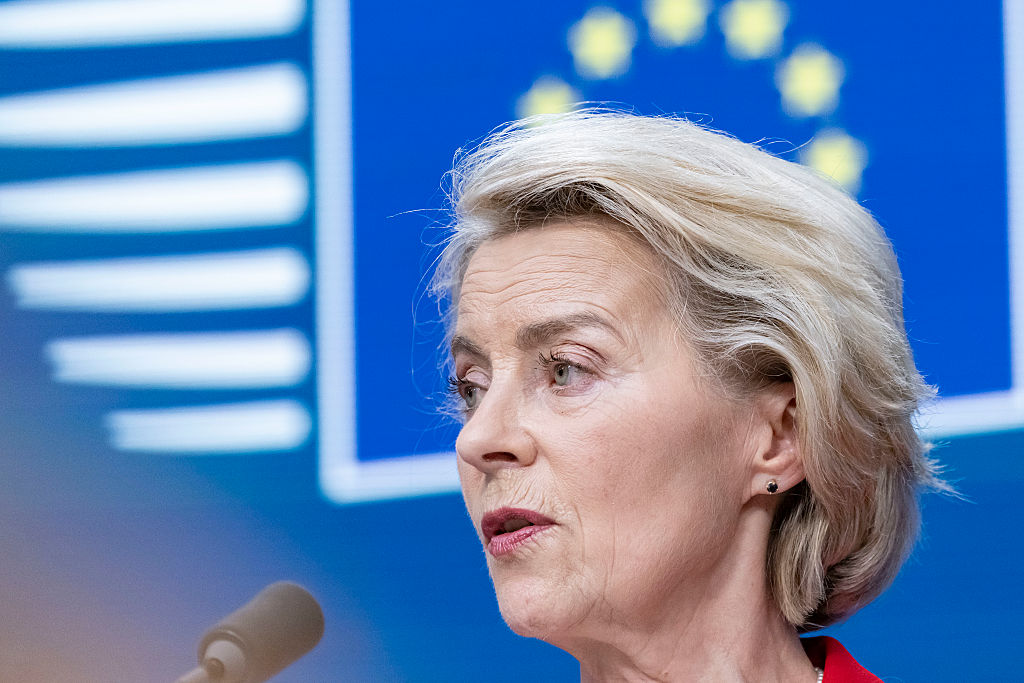Brussels has a legally “sound” basis for using hundreds of billions of euros’ worth of immobilised Russian central bank assets to fund a so-called “reparation loan” to Ukraine, European Commission President Ursula von der Leyen said on Wednesday.
Speaking ahead of a meeting of EU leaders in Copenhagen, von der Leyen said “there is a growing consensus” in EU capitals that Moscow, rather than European taxpayers, should fund Kyiv’s war effort and reconstruction.
“Russia is the perpetrator, it has caused the damage, and it has to be held accountable,” the Commission president told reporters. “I think we have now a sound legal way to do this.”
Her remarks were echoed by Kaja Kallas, the EU’s top diplomat, who said a “basic principle of international law is that you have to cover the damage you have caused”.
Announced by von der Leyen in her flagship annual State of the Union speech in September, the EU executive’s plan would harness up to €170 billion in immobilised Russian central bank assets to support Kyiv’s colossal budget needs and reconstruction.
Crucially, the scheme seeks to “mobilise” Moscow’s funds without affecting their “ownership” – thereby technically falling short of unilateral expropriation, which risks violating the assets’ sovereign immunity guaranteed under international law.
The Commission’s proposal is backed by Germany and many eastern European countries but has been vehemently criticised by Belgium, which is concerned that the assets’ legally improper use could trigger a mass exodus of investors’ capital from Europe.
Euroclear, a Brussels-based clearing house, holds the vast majority of the €200 billion worth of assets that were frozen by the EU shortly after Moscow’s full-scale invasion in February 2022.
Luxembourg’s Prime Minister Luc Frieden, whose country also holds some Russian sovereign assets, echoed Belgium’s concerns ahead of Wednesday’s meeting.
“You can’t just take over what belongs to another state so easily,” Frieden said. He added that the proposal raises a “whole series of questions” to which he “would like to have answers”, including how the loan would be repaid if Russia ultimately fails to pay reparations to Kyiv.
“All suggestions are welcome, but first we have to make sure that this also works in practice, and who is responsible for it at the end of the day,” Frieden said.
In a major victory for the Commission, however, French President Emmanuel Macron – who has staunchly opposed the assets’ confiscation – expressed support for the proposal.
“We will respect international law,” Macron said. “What the Commission has worked on … is a very good thing.”
Croatian Prime Minister Andrej Plenković also expressed confidence that the assets can be used in a legally sound way, although he stressed that EU capitals are still waiting for a “concrete legal proposal” from the Commission.
“Of course we need to take into accounts the interests of Belgium, and the company which is there, Euroclear,” he said.
Kallas, however, sought to downplay concerns – echoed by both Belgium and the European Central Bank – that the scheme could pose a risk to the financial stability of the eurozone.
“If you don’t start a war against another country, then you are out of the risk, and I think the majority of the countries, a majority of the people, a majority of the companies in the world, will not start wars against other countries,” she said.
Belgian Prime Minister Bart De Wever – who said last week that the Commission’s plan “is not going to happen” – did not speak to reporters ahead of the meeting.
(vib)
Nikolaus Kurmayer contributed reporting.
CORRECTION: This article has been amended to reflect that the State of the Union speech was made in September.
